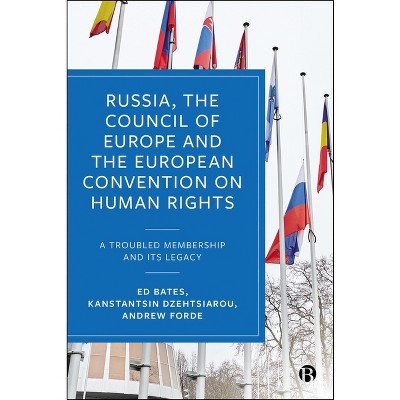Sponsored

The 1969 'Greek Case' in the Council of Europe - (Hardcover)
In Stock
Sponsored
About this item
Highlights
- In 1969 Greece withdrew from the Council of Europe (CoE), following pressure exercised by various European countries, organisations, social movements and individuals in response to the brutal conduct of the military junta that had taken power by force on 21 April 1967.
- About the Author: Konstantinos (Kostis) Kornetis is Assistant Professor of Contemporary History at Autonomous University of Madrid, Spain.
- 312 Pages
- History, Europe
Description
About the Book
An interdisciplinary exploration of the impact of the 'Greek Case' at the Council of Europe (1969) on the emerging field of human rights.Book Synopsis
In 1969 Greece withdrew from the Council of Europe (CoE), following pressure exercised by various European countries, organisations, social movements and individuals in response to the brutal conduct of the military junta that had taken power by force on 21 April 1967. This volume brings together an international cast of noted historians, oral historians, political scientists, and legal scholars to investigate the perceptions, policies and roles of the key actors involved. These figures range from international organizations, states, and social movements to NGOs and individuals, critically demonstrating the extent of the legacy and long-term impact of the 'Greek Case' on international human rights.
The 1969 'Greek Case' in the Council of Europe reveals how the pressure applied by the Council of Europe proved to be crucial for the international condemnation of the Colonels' regime, setting a precedent in international human rights cases for the significance of the collection of evidence on the use of torture.Review Quotes
"The volume's significance lies in its publication in an era of increased democratic backsliding. A new generation could be attracted by and learn from the battles of previous generations." --CEU Review of Books
"[A] game-changer ... Contributions in this volume, focussing on the notable jurists and surviving victims as well as the critical perspectives presented countering an all-out celebration of the case, make it essential reading for activists, academics and adjudicators working at the nexus of 'law and torture'." --Nordic Journal of International Law "This is a thought provoking, well researched, and exhaustive collection of a landmark case regarding human rights, the use of torture, and the development of European institutions and legal concepts as they emerged from the investigation and eventual withdrawal of Greece from the Council of Europe following the coup d' etat of 1967 and the establishment of a military dictatorship. This is an essential volume for anyone interested in human rights and the campaign against the use of torture by state agents." --Evdoxios Doxiadis, Associate Professor, Simon Fraser University, CanadaAbout the Author
Konstantinos (Kostis) Kornetis is Assistant Professor of Contemporary History at Autonomous University of Madrid, Spain. He is the author of Children of the Dictatorship (2013, winner of the Edmund Keeley Book Award) and co-editor of Rethinking Democratization in Spain, Greece and Portugal (2019).
Víctor Fernández Soriano teaches global and contemporary history at the Université Libre de Bruxelles and ESPOL Lille. He has been an associate researcher at the University of Luxembourg and Humboldt University Berlin. He is the author of Le fusil et l'olivier. Les droits de l'Homme face aux dictatures méditerranéennes (2013). Kristine Kjaersgaard is Associate Professor in Contemporary History at University of Southern Denmark, Denmark. She has written books and articles on Denmark in international organisations. Nicolas Manitakis is Associate Professor in History at the University of Athens, Greece. He has co-edited a volume on the history of postwar Greek student migration to France. Alexandros Nafpliotis holds a PhD in International History from the London School of Economics and Political Science, UK, and has been a Research Associate at the Hellenic Foundation for European & Foreign Policy and the National Hellenic Research Foundation, as well as Maastricht University and the University of Luxembourg. He is the author of Britain and the Greek Colonels (2012). Anna Papaeti is a musicologist and researcher who has held a Marie Curie Fellowship at the University of Goettingen, Germany.










